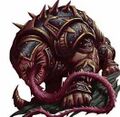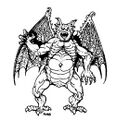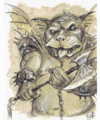Yugoloth

Also known as daemons (no, not those Daemons), Yugoloths are the neutral evil grid-fill for the devils and demons in post-1980 Dungeons & Dragons.
The first published were the Mezzodaemon and Nycadaemon of D3, just chillin' in Erelhei-Cinlu as fiends do; whence they went into the Fiend Folio, and then got more buddies in the second Monster Manual. A decade later 2e did to daemonkind what it did to the Baatezu and Tanar'ri (and Gehreleth), changing the name to some babble, because it SOUNDED too much like "demon" for Lorraine Williams to allow in an RPG.
But in this (rare) case That Woman had a point. Their name was always redundant with "demon"; and as spelled out, it conflicts with the ancient Greek word for “spirit” or even "lesser god" - Socrates had a daemon with him, for instance. And the eeevil daemons never enjoyed anything like the popularity as the two major fiendish races on either side, nor were they as well known. Her name-change didn't help their case, though. We'll get to some reasons why not.
Originally the Neutral Evil outworlders daemons got allocated to the Gray Waste of Hades, though Planescape shifted most of them to Gehenna because Hades really sucks. In 5e this has actually been retconned into their home plane for some fucking reason.
Yugoloths embody the platonic idea of Evil itself. Not “evil”, mind you, but capital-e Evil. They lie, cheat, and betray for its own sake, and generally seek to cause as much suffering and hate as possible to everyone. Whereas the demons embody anarchy, and the devils embody tyranny, the yugoloth embody sociopathy. They're kind of dicks like that. They act as mercenaries (primarily in the Blood War, but they'll work for anyone who can meet their price, even their polar opposites the Guardinals), constantly switching sides between the factions involved in whatever conflict they were paid to fight in (this can happen multiple times in a single battle). In fact, there are conspiracy theories that they are the original fiends and/or that they're the ones who started the Blood War and are playing it to their own end.
The term "Yugoloth" is still being used in 5th edition even though "Baatezu" and "Tanar'ri" and other terms for evil outsiders which 2nd edition had pulled out of Lorraine's fat ass were dropped. As noted, "daemon" never was a good name for them.
Why The Yugoloths Are FAIL
As to why the Yugoloths own the Great Wheel's Wooden Spoon (as Victorians called it), behind Law's and Chaos': A philosophical reason might be that "pure" evil without a desire to destroy or dominate doesn't actually seem likely to do much of anything with real consequences. A narrative-based reason might be that demons and devils are more easily contrasted with each other. A more realistic reason for their low profile is that they're just really boring, having failed to tap into the predominant Abrahamic mythos the way that tanar'ri demons and baatezu devils did. The Archdemons are some of the biggest, baddest, and most horrifying creatures in the entire setting, while the ruler of the Nine Hells is a strategic mastermind who pretends to be The God-Fiend of the Pit, Master of Slavery and Tyranny because that is less threatening than what he really is. Not to mention a wide variety of lesser demons who are iconic, terrifying, and awesome. Despite the fact that in Gygax's Come Endless Darkness novel the oinoloth Infestix and the deity Nerull are the same being, the sociopathic bitch had already ousted D&D founder Gary Gygax from TSR so Nerull-as-Infestix was never included in published game materials; yugoloths have fewer interesting leaders (about which very little is known), just a city that moves around or some shit. Forget these assholes and get back to headbutting pit fiends in Baator; D&D publishers dropped the ball by not publishing a neutral evil bale fiend yugoloth, which would have fit perfectly in Planescape's notion that yugoloths were the origin of the other fiends.

Yugoloths' heyday was Planescape, where they met an actual niche as the Blood War's profiteers. But here they were battling hags for market-share. And then they lost even that in 3e and beyond.
With Planescape not getting an official 3.x release, and the Blood War thusly getting a lot less shilling, the yugoloths were mostly forgotten aside from the occasional update in a Monster Manual. In 4e they lost their whole reason to exist with the almost non-existent Blood War and were instead made a subtype of Demon. The jackal-like Arcanoloths were even divorced entirely from the Daemon family tree and made an entirely new species of scheming, manipulative evil immortals called Raavasta.
In 5e, Yugoloths were created by the Baatezu in order to combat the Tanar'ri. However, the Baatezu lost control of them, and now they're a mercenary fiend race giving their help wherever the most profit is to be made.
Pathfinder avoided the Yugoloth name for copyright reasons, with their daemons becoming an omnicidal race lead by (a version of) the Four Horsemen of the Apocalypse. But after the Legacy of Fire Adventure Path introduced Divs... why even bother?
Truly the yugoloth is well named, to sum up; putting a daemon in your campaign is like driving to prom in a 1982 Yugo.
If You Gotta Use 'Em
Whereas devils are living embodiments of oppressive tyranny and demons living embodiments of mayhem and anarchy, the Yugoloth are living embodiments of opportunistic sociopathy. Whereas the mind of a devil or demon is sufficiently diluted by law or chaos for them to care about a larger cause (multiversal conquest and destruction, respectively), a Yugoloth doesn't give a crap about anything other than its own well being and agenda. Which, if one thinks about it, should ironically make them far more amiable and cooperative than either demons or devils, since they wouldn't give two rat's asses about where their pay is coming from, so long as their price is being met (and woe betide any moron who should try to stiff them).
As for deals: Devils of course prefer rigidly formal contracts with maximized loopholes (on their side of the deal) and Fine Print (on the other side), so it would stand to reason that demons, when they bother to enter such a relationship at all instead of simply killing you, would prefer informal agreements and promises with flexible and non-binging terms. Yugoloth, then, would go with either one or something in between, whichever they'd think would benefit them most at the time. Also, you probably shouldn't pay them up front, in which case they might just take then money, kill you, and take the rest of your stuff.
In other words, they're murderhobos but smarter.
As Player Characters (LOL)
It should come as no surprise that the same edition of D&D that made neogi, flying ghost brains, extraplanar robots, mind flayers, and the ixitxachitl playable or pseudo-playable also took a shot at making Yugoloths playable. Specifically, the Canoloth, of all variants, was given a level adjustment in the 2001 Manual of the Planes, although between the adjustment and racial hit dice they're largely still unplayable.
The Truest Fiends
The Yugoloth maintain a number of strongholds on the Lower Planes. Their biggest one is the Crawling City making its way on the slopes of Gehenna. Here the General of Gehenna, the leader of the Yugoloth, holds his court and plots against the Multiverse itself. Also on Gehenna is the Tower Arcane, where the Arcanoloth record all the deals made with mortals and Outsiders alike. Hades houses Khin-Oin, a massive tower allegendly made from the spine of a deity the Yugoloth killed. Here many of the soldiers of the Yugoloth armies live and train. Finally there is the Tower of Incarnate Pain, which is still under construction in Carceri. Made from the screaming bodies of petitioners and the skin of a dead god, the Yugoloth intend to use the tower to link their two other towers and obtain considerable power that way. The native inhabitants of Carceri, the Gehreleth do not agree with this and frequently attack the tower to tear it down. Without their attacks the Yugoloth would have been done centuries ago, but because of the actions of the Gehreleth they are far behind on schedule. While the fiends are very limited in number and the Yugoloth could easily crush them with a superior force, they do not do this because it would draw too much attention to their secret project.
The Shapes of Evil
Yugoloth Creations
- Canoloths eyeless quadrupedal guard dog yugoloth with the tongue
you wish your boyfriend hadof a chameleon. the area around them is a no-teleport-zone. Depending on the contract, being caught by a Canoloth either means death or him siting on you until the big man comes to get you.
- Guardian Yugoloths: Least, Lesser, Greater.
- Battleloths: Arrow, Axe, Crossbow, Pick, Spiked Chain, Sword.
Lesser Yugoloths
- Mezzoloth: Mid-ranking bug monsters. Are the proper foot soldiers. Really like money and violence. Most notable for dropping massed Cloudkill spells.
- Dergholoth (also spelled Dhergoloth): Remarkably ridiculous four-armed insectoids in D&D; their heads don't turn, but their entire torso whirls about wildly. Pathfinder's derghodaemons however look like nightmares of Ginsu blades that could vivisect you before you could even scream. They love slaughter and will often fumble complicated orders (on purpose).
- Hydroloth: Flying frog monsters. Take dips into the Styx, which makes their minds both scrambled and unreadable. Trade in information, ironically.
- Yagnoloth: Goofy-looking lopsided freaks, yagnoloths bear much of the blame for why D&D aficionados typically regard tanar'ri and baatezu as cooler than yugoloths. is a lieutenant over other lesser yagnoloth, being a mediator for contract signing when it's not worth an Arcanaloth's time.
- Marraenoloth (also spelled Merrenoloth): Boatmen of the Styx. Loyal to their boats and nothing else.
Greater Yugoloths
- Nycaloth : Classically horned and draconian winged fiends. Headsmen and executioners. They're large, brutish, and carry vorpal axes. In 3rd edition D&D nycaloths gained the distinction of having four arms. Although Nycaloths' combat abilities are some of the most underhanded among Yugoloths, they can be one of the most loyal Yugoloths if treated well (well you're going to have to bribe them quadruple their usual pay instead of the usual double).
- Arcanaloth: Probably the most famous of the yugoloth species [at least among furry fans], arcanaloths look like anthropomorphic jackals and are known for managing the mercenary contracts that are the lifeblood of the yugolothic personal involvement in the Blood War. In essence, all contracts to hire yugoloths ultimately get approved by these guys. These guys are perhaps best known because they have two representative characters living in Sigil; A'kin the Friendly Fiend, a seemingly benevolent (not that anyone buys it) merchant, and Shemeshka the Marauder, aspiring to be the biggest wheeler-dealer in the Cage, who calls herself "King of the Crosstrade" and is famous as one of the first canonical non-cisgender NPCs -- she calls herself female, but her profile in the Sigil bigwig NPC splat "Uncaged: Faces of Sigil" depicts her with a male symbol, implying she's trans. Of course, according to Faces of Evil, all yugoloths are hermaphrodites (
not that the hypothetical sex of a fiend even matters, since fiends of all varieties "reproduce" by uplifting Maggots, which are the forms evil mortals take upon dying and arriving at any of the lower planes. Actually, yugoloths don't reproduce from maggots/larva. They procreate as mammals do, and when one dies, another mezzoloth is spat out, ensuring their numbers never decrease). By 4th edition D&D the publishers finally realized that jackal furries (only some of which even have horns) are just not daemonic enough, and so retconned them to instead be the raavasta race (with distant yugoloth ancestry). If D&D publishers had actually put effort into making arcanadaemons, well, daemonic, they all would have had larger-than-merely-token horns, mange-exposed patches of diseased skin, and one or more additional monstrous/daemonic features (such as tentacles). But they didn't, so now they're back to being Yugoloth.
- Ultroloth: Unlike the pit fiends and balors of the devils and demons, respectively, the leaders of the yugoloths are thinking, scheming mages-sneaks that disguise their strength behind melted, emaciated, and shifting forms rather than roar into battle wreathed in flame. Unfortunately, the fact that ultroloths have zero daemonic features and instead look like
weather balloonssci-fi aliens is much of why Balor demons and pit fiend devils better fascinated dungeon masters and players alike, whose cultural mythos is primarily Abrahamic. Now imagine an ultroloth but with large horns and tentacles; much more daemonic, eh?
Altraloths
If they are willing to serve the Night Hags for a specific purpose, a yugoloth can choose to undergo a ritual to become a powerful new being: an altraloth. In a long and painful ritual any yugoloth from mezzoloth to ultraloth can be turned into a new creature of superior power, but to do this they will have to enter a contract with the Night Hags and complete its terms before being freed. Most yugoloth chafe at this because they are not able to betray their new mistresses: hurting them will result in unspeakable pain for the altraloth, and if one of them were to die for any reason the altraloth perishes as well. As such, they are invested to the wellbeing of their masters and will do anything to protect them.
Baernaloths
Unverified ancient texts claim that baernaloths were the first fiends, and the origin of the other fiends. It's said that every individual powerful being in the Lower planes has a baernoloth hand in their origin, including the Obyrith, who are said to have been lured to this multiverse in the first place by the Baernoloth. Those versions which TSR/WotC have published so far have sucked the papery scrotum of Hades himself. Homebrew versions exist online, though, worthy of these most primordial of fiends.
Notable because as the eldest evils native to the Great Wheel (save perhaps the Aboleth), they acquire various abilities from various sources over the eons in addition to the ones they already have just from being a baernoloth, and each one has a different set. Some of the more notable ones from the list include one where whatever being that kills them is transformed body and mind over time into the baernoloth they killed, one where they can summon any other individual fiend in all the lower planes, including a Demon Prince or Archdevil, one where they can spend a week meditating to grant themselves one unique ability, quality, attack, etc. from any other breed of fiend, and the ability to Dominate all evil creatures below CR 12 within 300ft of itself.
Also notable for spending their time doing nothing but tormenting other beings, and they don't even seem to take any joy in it. Oh they don't regret their actions in the slightest, it's just that in their minds, they exist to torment, and all other beings exist to be tormented.
Oinoloths
The prefix oino- means "one"; the word oinoloth is a title of the yugoloth ruler of Hades, not a type of yugoloth, though the process of attaining the oinoloth title could conceivably involve a transformation.
...at least originally. now the being with the best claim to being "ruler of all yugoloth" is the General of Gehenna, assumed to be an ultraloth, and now oinoloths are just another type of yugoloth that specializes in disease.
Yugoloth Lords
Most active yugoloth lords are altraloths.
- Anthraxus the Decayed - altraloth (and held oinoloth title)
- Bubonix - altraloth
- Charon (a.k.a. Cerlic) - altraloth
- Cholerix - altraloth
- The General of Gehenna - ultroloth (and probably an altraloth)
- Helekanalaith - arcanaloth
- Infestix - Gygax's Come Endless Darkness novel posits that the first oinoloth Infestix and the deity Nerull were the same being.
- Mydianchlarus - ultroloth (and held oinoloth title)
- Taba - altraloth
- Typhus - altraloth
- Xengahra - altraloth
See Also
Gallery
| The inhabitants of the Planes of Planescape | |
|---|---|
| Upper Planes | Aasimon • Angel • Animal Lord • Archon • Asura • Eladrin • Guardinals • Lillend |
| Middle Planes | Formians • Githzerai • Inevitable • Marut • Modron • Rilmani • Slaadi • Kamerel |
| Lower Planes | Alu-Fiend • Baatezu • Bladeling • Cambion • Demodand • Erinyes • Hag • Hordling • Imp • Kyton • Loumara • Marilith • Obyrith • Succubus • Tanar'ri • Yugoloth |
| Transitive Planes | Astral Dreadnought • Githyanki |
| Inner Planes | Azer • Elemental • Genie • Grue • Mephit • Salamander • Sylph |
| Sigil | Dabus • Cranium Rat |
| High-ups | Archangel • Archdevil • Archfey • Archomental • Demon Prince |


















































